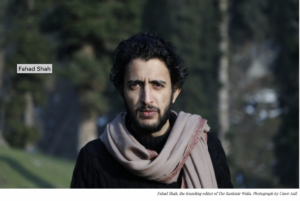‘Innocent until proved guilty’ is an abiding principle for judicial process, one that has been given the go by in numerous cases, thanks to selective police leaks and a brutal media trial that can dangerously prejudice public opinion.
But now, an order of the Delhi High Court in the Delhi violence case against Pinjra Tod activist Devangana Kalita, there is hope for some course correction. In his order, Jusice Vibhu Bhakru of the Delhi High Court has directed the Delhi police ‘not to issue any further communication naming any accused or any witness till the charges, if any, are framed and the trial is commenced’.
The case arose out of a petition filed by Kalita, who said that Delhi police had leaked allegations about her to the media even while the investigation was pending. Kalita, along with another activist of the student organisation, Natasha Narwal, had been arrested on May 23 for alleged involvement in the violence in Jafrabad where women were in a sit-in against CAA-NRC. Both are accused in four FIRs and were granted bail but re-arrested on charges under the Unlawful Activites (Prevention) Act (UAPA). Devangana Kalita is an MPhil student at JNU’s Centre for Women’s Studies and Natasha Narwal is a PhD student at the Centre for Historical Studies.
On June 2, Delhi police issued a ‘brief note’ to the media stating that they duo ‘were actively involved in hatching a conspiracy to cause riots near Jafrabad Metro Station’. The petitioner contended that the ‘investigation agency (Delhi Police) has leaked information selectively to the media with a view to spread a false propaganda against the petitioner and prejudice public opinion.’ Various messages were circulated on social media, as well as by news media outlets, TV media outlets and social media handles which relied on the allegations in the note, to decry the petitioner as guilty for her alleged role in the violence that had broken out in North-East Delhi.
Her lawyer, Adith Pujari, argued that the note was issued by the Delhi Police in an attempt to prejudice the petitioner’s right to a fair trial and violated Article 21 of the Constitution of India. The note was issued for the purpose of destroying the presumption of petitioner’s innocence and circulated with a well thought out purpose to make selective leaks leading to trial by media and to establish the petitioner’s guilt prior to her being tried. Thus, Delhi police had caused immense damage to the petitioner’s reputation and her fundamental right to a fair trial as it has weakened the presumption of her innocence.
He also referred to guidelines whereby police were directed to take precautions in not disclosing the names, religion,caste, or social position of the persons involved (be it the accused,victims or witnesses) in riots cases and to several judgements governing police interaction with the media in cases pending trial.
Arguing for the respondents, Additional Solicitor General Aman Lekhi said there was no dispute about the principles governing police interaction with the media set out by the Supreme Court . However, he said Delhi Police had not issued the note with the intention of causing any prejudice to the petitioner or with a view to attack her reputation but for the sole purpose to accurately portray the case. Instead, he said a media campaign was carried out by members of the ‘Pinjra Tod’ and their supporters to sway the public opinion against the actions of the Delhi Police!
Download order here:
devangana kalita Bakhru order dtd 25.07.2020 on police media trial


